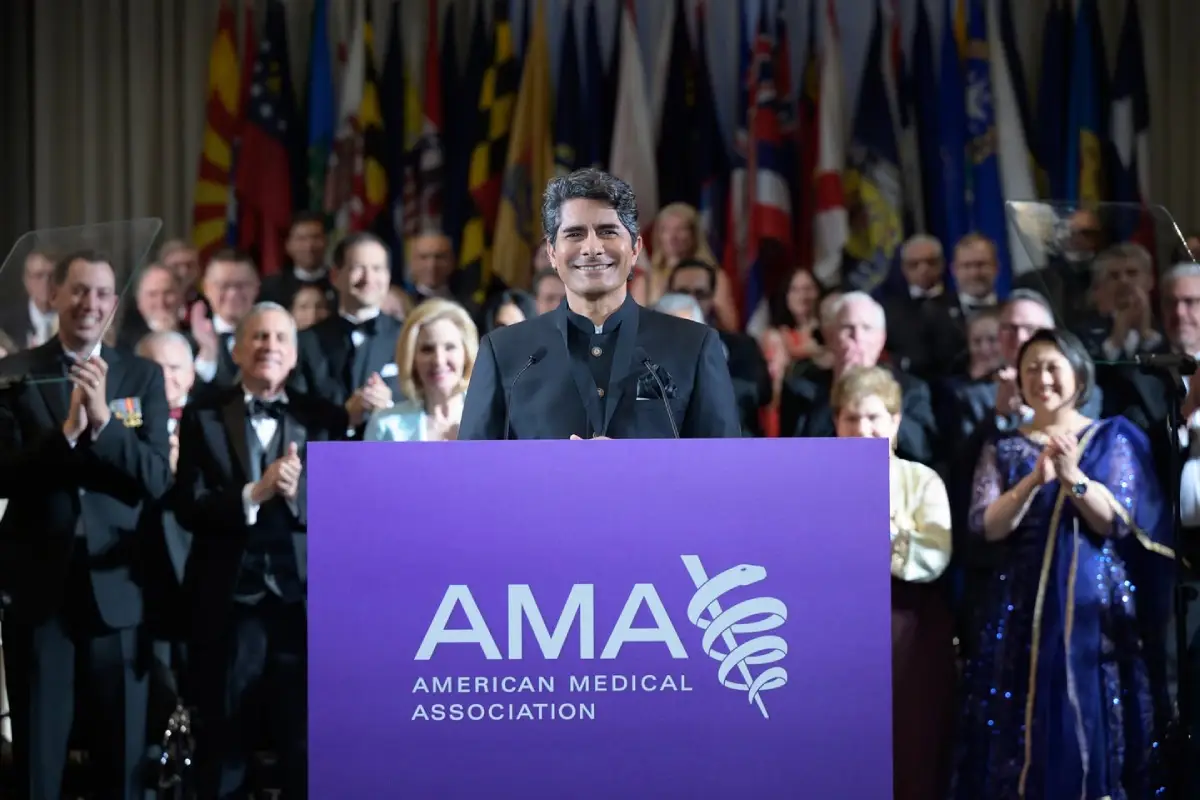
Mukkamala’s Journey Informs AMA Presidency: Equity, Science At Forefront
Photo: AMA
India-West Staff Reporter
CHICAGO, IL – Dr. Bobby Mukkamala, an otolaryngologist whose family roots trace to Andhra Pradesh, has taken over as President of the American Medical Association (AMA), marking a historic moment as the first Indian American to lead the organization in its 178-year history.
His inauguration as the AMA’s 180th President comes with a profound personal narrative that he says will shape his tenure.
“To call this moment humbling doesn’t capture it,” Mukkamala stated at his inauguration in Chicago. “It’s moving. It’s awe-inspiring.” This sentiment resonated deeply, particularly in light of a significant health challenge he faced just months prior.
Last November, an 8-cm temporal lobe tumor was discovered on the left side of his brain. Three weeks after this diagnosis, the 53-year-old father of two underwent surgery, resulting in the removal of 90 percent of the tumor—a best-case scenario.
This personal battle with cancer, Mukkamala explained, has fundamentally reaffirmed the purpose of his leadership. A long-time patient advocate, he emphasized that his lived experience will now underscore his platform, driving his efforts to champion a more equitable healthcare system.
“I am here tonight because of the brilliance of many skilled physicians, because of the enduring love and patience of my family and friends, and because our health care system—for all its flaws, and there are many—is still the best in the world for people like me,” he reflected.
However, Mukkamala quickly highlighted a critical disparity in access and experience within the system. “But that is not true for everyone. Most patients who walk through our doors have a much different experience.” He pointed out that while he benefited from the best possible treatment, many patients grapple with “far more troubling questions than reassuring answers” concerning insurance coverage, medication costs, or lengthy wait times for specialist appointments, even for serious conditions like a lump in the neck.
To address these systemic issues, Mukkamala articulated a clear vision for collective action. “Our health system needs the input of many skilled physicians—physician leaders across every state and specialty—who are working together with incredible purpose and urgency,” he urged. He underscored the AMA’s critical role in this effort, asserting, “It needs the AMA more than ever, with leaders in our profession speaking with one firm and commanding voice.”
Mukkamala also attributed his survival and his ability to assume the AMA presidency to “decades of government-backed medical research and innovation.” He issued a warning that the kinds of treatments and scientific breakthroughs that saved his life are at risk in the current political climate, where investment in science and medicine faces increasing politicization or deprioritization.
In the weeks following his surgery, Mukkamala began compiling a personal file he termed “tumor wisdom.” This space became a repository for reflections on everything from clinical empathy to spiritual humility. Through this challenging period, he gained clarity on what truly matters: connection, compassion, and the urgency of addressing matters immediately rather than deferring them. This profound ethos, he conveyed, will now guide his approach to his term as AMA president.
Separately, during the AMA House of Delegates’ meeting, which concluded on June 11, the organization adopted a new policy. This policy focuses on distinguishing between unhealthful, ultraprocessed foods and healthful, minimally processed or unprocessed foods. As part of this initiative, the AMA also encourages the integration of nutrition education into all levels of medical education, empowering physicians to better counsel patients on reducing the consumption of ultraprocessed foods.



